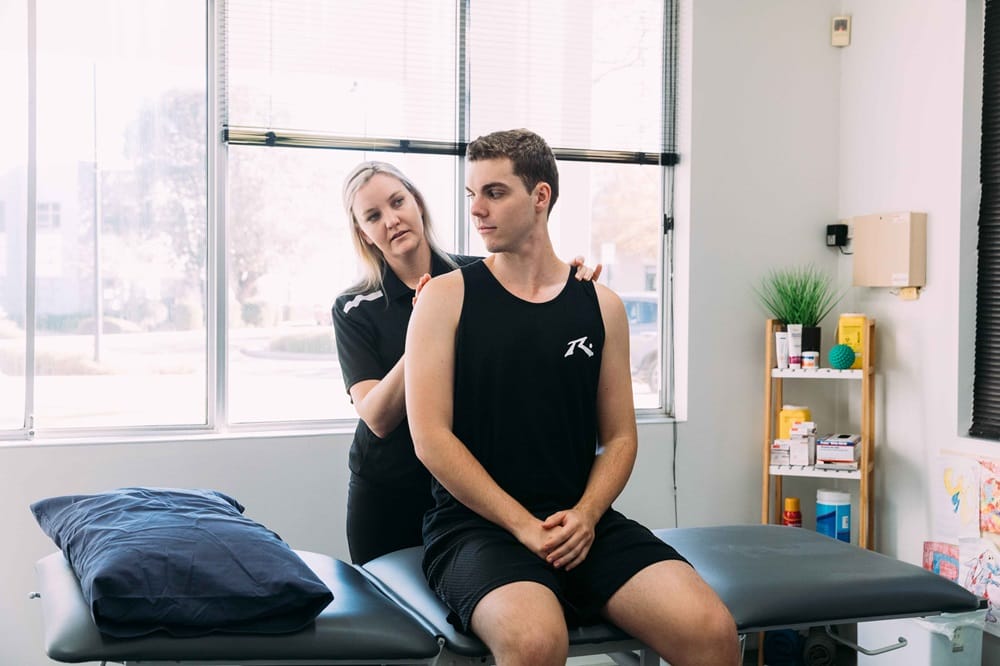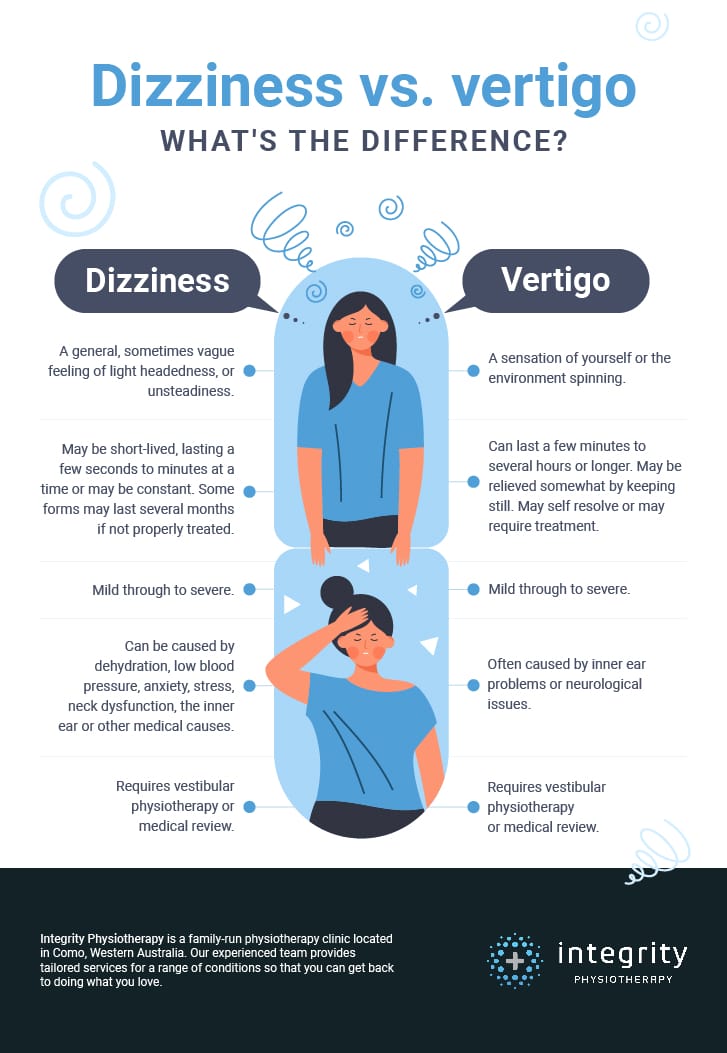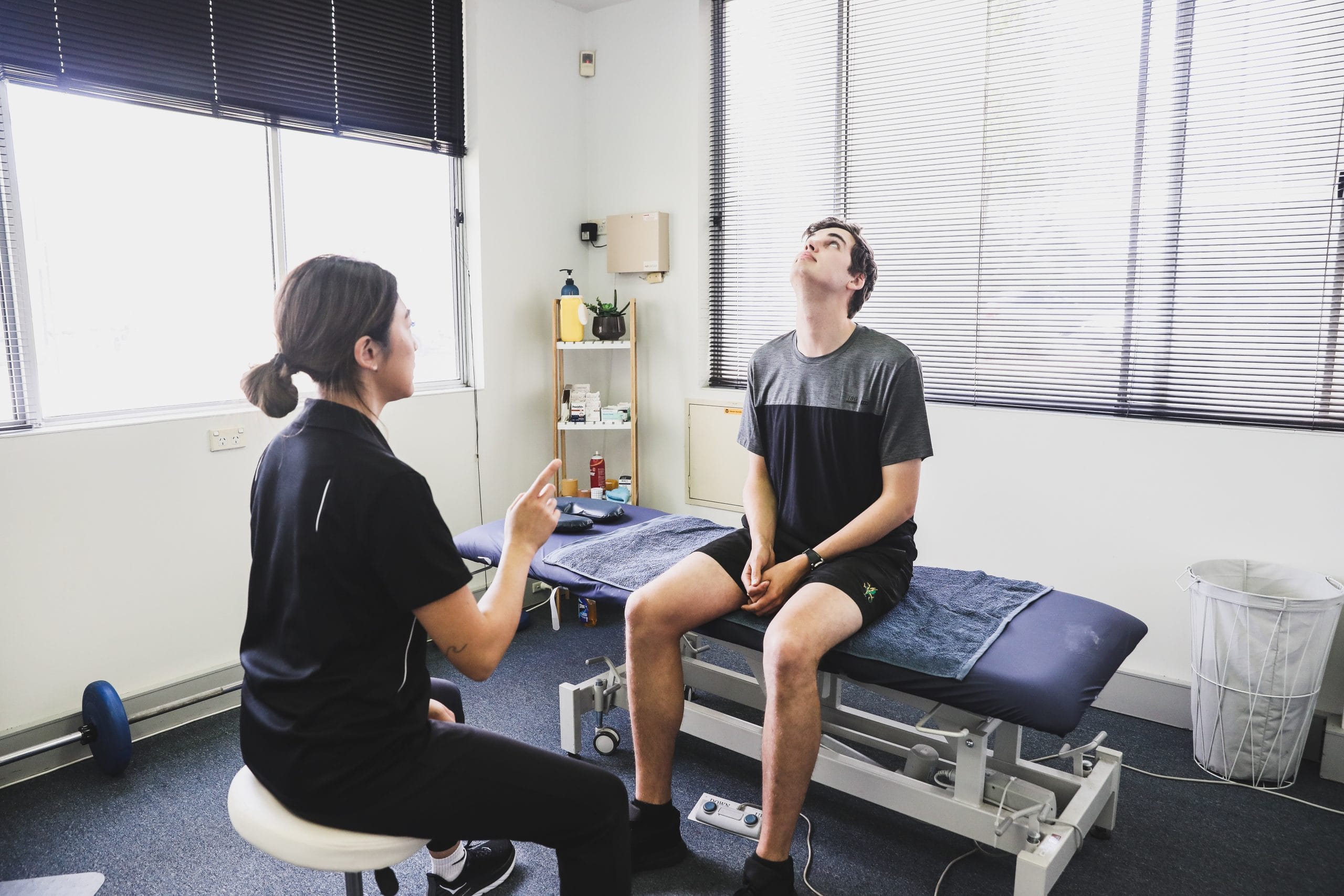
Navigating the complexities of dizziness and vertigo can be as unsettling as the conditions themselves. Often used interchangeably, these terms describe distinct experiences that can significantly affect your life.
At Integrity Physio, we understand the nuances of these conditions and the profound impact they can have. We want to demystify dizziness vs vertigo and highlight how physiotherapy can offer relief and improve your quality of life.
What is dizziness?
Dizziness covers a wide array of sensations that can disrupt your equilibrium and sense of well-being. But one thing to keep in mind about dizziness is that it’s a symptom, not a disease. It’s often a sign of something else going on. Often described as feeling lightheaded, woozy, weak, or unstable, dizziness can happen without warning, making even the simplest tasks feel daunting.
You might feel insecure while walking, standing, or even performing tasks that require concentration. This unpredictability can lead to a reduced quality of life, increased risk of falls and, in some cases, social isolation due to fear of experiencing dizziness in public settings.
It’s crucial to understand that dizziness itself is a non-specific term that can signify other underlying issues, ranging from benign to serious.
Causes of dizziness
The causes of dizziness are varied; in fact, there are so many potential causes of dizziness that you’re generally better off visiting your GP to get to the bottom of it. However, common causes include:
- Low blood pressure (hypotension): A sudden drop in blood pressure when standing up, known as orthostatic hypotension, can cause dizziness and fainting.
- Dehydration: If you haven’t been drinking enough water, especially during hot weather or physical activity, dehydration can occur, making you feel dizzy.
- Medication side effects: Some medications can cause dizziness as a side effect, particularly those that lower blood pressure or affect the central nervous system.
- Inner ear issues: Conditions affecting the inner ear, like labyrinthitis or vestibular neuritis, can disrupt your balance and lead to feelings of dizziness.
- Anemia: A lack of red blood cells to carry adequate oxygen to your brain can result in dizziness.
- Neurological conditions: Less commonly, neurological disorders like Parkinson’s disease or multiple sclerosis may manifest dizziness as a symptom.
- Low blood sugar: If your brain lacks glucose, its main energy source, you may experience dizziness.
- Cervical dizziness: Results from neck disorders disrupting signals to the brain, causing dizziness with neck movement or position changes.
LEARN MORE about the potential causes of dizziness.
What is vertigo?
Vertigo is a more specific manifestation of dizziness, characterised by the false sensation that you or your surroundings are spinning or moving when there is no actual movement. This illusion of motion is disorienting and can be quite intense, leading to significant distress and disruption in daily activities.
Vertigo can severely affect your ability to maintain balance and can lead to nausea, vomiting, and difficulty walking or standing. The unpredictability of vertigo episodes can cause anxiety about when the next episode might occur, and can impact your ability to drive, work, or engage in social activities. Concentration and focus can also be compromised, making tasks that require precision or attention to detail particularly challenging.
Underlying causes of vertigo
Vertigo often arises from issues in the inner ear, which plays a critical role in maintaining our balance. Common conditions leading to vertigo include:
- Benign Paroxysmal Positional Vertigo (BPPV): Small calcium particles clump in the canals of the inner ear, causing brief but intense dizziness triggered by changes in head position. (READ MORE about BPPV)
- Meniere’s Disease: An inner ear disorder that affects balance and hearing, characterised by episodes of vertigo, hearing loss, ringing in the ear (tinnitus), and a feeling of fullness in the ear.
- Vestibular Neuritis: Inflammation of the vestibular nerve, which sends signals from the inner ear to the brain, can lead to vertigo and balance issues.
READ MORE: Can stress cause vertigo?

Dizziness vs vertigo: key differences
While both can disrupt daily life, understanding the differences between dizziness and vertigo is crucial for effective management.
Key differences between vertigo and dizziness include:
Nature of sensation
- Dizziness: A feeling of lightheadedness, unsteadiness, or feeling faint without a sense of movement.
- Vertigo: Specifically involves a sensation of spinning or movement, either of yourself or your surroundings.
Signs and symptoms
- Dizziness: Symptoms may include feeling faint, unsteady, or a loss of balance without movement.
- Vertigo: Characterised by a strong illusion of rotational movement, leading to nausea, balance problems, and potentially vomiting.
Impact on daily activities
- Dizziness: Can cause general feelings of instability, affecting confidence in performing daily tasks.
- Vertigo: Episodes of spinning can severely disrupt daily activities, making it difficult to stand, walk, or focus.
Diagnosis
- Dizziness: Diagnosed based on medical history, physical examination, and sometimes further testing to identify the root cause.
- Vertigo: Often requires specific tests to evaluate inner ear function and balance, pinpointing the exact cause for effective treatment.
Treatment
- Dizziness: Treatment of dizziness may involve lifestyle adjustments, treatment of underlying conditions, exercises or medication changes.
- Vertigo: Treatment focuses on vestibular rehabilitation exercises, manoeuvres to correct inner ear issues, and managing underlying diseases.
Diagnosis and assessment
- Medical history review: With your health practitioner, you’ll have a thorough look into your health background to identify any potential causes linked to your symptoms.
- Symptom analysis: Dizziness and vertigo don’t operate in isolation. They bring along friends like nausea, imbalance, or ear problems. By mapping out your symptoms, we can get a comprehensive picture of your experience and distinguish between the broad spectrum of dizziness and the specific nature of vertigo.
- Balance assessments: You’ll be taken through some balance and vestibular tests, both simple and advanced, to evaluate your vestibular system’s function and help pinpoint whether issues stem from inner ear disturbances.
- Personalised assessment: You’re unique, and so is your experience of dizziness or vertigo. A customised evaluation will reflect your unique experiences and ensure the resulting treatment plan addresses your specific needs and lifestyle.
- Collaborative treatment strategy: Next comes transforming diagnosis into action. Vestibular physiotherapy includes a comprehensive plan that combines physiotherapy interventions with practical lifestyle adjustments.
How physiotherapy can help
Through a combination of specialised interventions, our physiotherapists are equipped to tailor treatments that address the unique manifestations of these conditions.
Vestibular Rehabilitation Therapy (VRT)
VRT is designed to alleviate both the primary and secondary problems caused by vestibular disorders. It involves a series of exercises tailored to your specific symptoms and needs. Goals of VRT include:
- Improving balance: Through exercises that challenge the vestibular system, we work with you to improve your stability and reduce the risk of falls.
- Enhancing gaze stability: We use techniques to help control eye movements, reducing vision disturbances and improving focus.
- Desensitisation: Repeated exposure to certain movements or stimuli can help decrease sensitivity and reduce the intensity and frequency of dizziness and vertigo episodes.
Customised exercise programs
Beyond VRT, our Perth vertigo physiotherapy develops customised exercise programs aimed at improving your balance and coordination. These exercises are designed to meet your lifestyle and physical capabilities, ensuring they are both effective and sustainable.
Manual therapy
For some, manual therapy techniques can be beneficial, especially if neck stiffness or musculoskeletal issues contribute to the sensation of dizziness. By addressing these physical factors, physiotherapy can provide a more holistic approach to managing symptoms.
Education and lifestyle advice
A key component of physiotherapy is education. Understanding what triggers your episodes of vertigo or dizziness, how to perform exercises safely, and ways to adjust daily activities empower you to manage your condition more effectively. Lifestyle advice can also include dietary modifications, hydration tips, and stress management strategies.
Self-help tips and management strategies
Optimise your daily routine with these concise, effective strategies to help manage symptoms of dizziness and vertigo.
- Hydration: Aim for 8-10 glasses of water daily to prevent dehydration-related dizziness (and just because it’s good for you!)
- Home safety: Declutter walkways and use grab bars to minimise fall risks.
- Exercise gently: Perform balance-improving exercises as advised by your GP or physio.
- Diet tweaks: Reduce your intake of salt, caffeine, and alcohol if you find they trigger symptoms.
- Stress reduction: Incorporate deep breathing or meditation into your routine to manage stress.
- Consistent sleep: Maintain a regular sleep schedule for better symptom control.
- Mindful movement: Rise slowly to avoid sudden dizziness from quick position changes.
- Focus technique: Stabilise dizziness by focusing on a stationary object during changes.
- Earplug strategy: Use an earplug in your affected ear in noisy situations to reduce discomfort.
When to see a physiotherapist
Consider booking in for vestibular physiotherapy if you experience:
- Ongoing or recurrent episodes of dizziness or vertigo
- Difficulty maintaining balance, frequent falls, or unsteadiness
- After a head injury, if dizziness or balance problems persist
- If balance or dizziness issues arise following surgery
- When dizziness or vertigo affects your ability to move or exercise
- If you’re looking to safely increase your activity level but have concerns about dizziness or balance
- When symptoms significantly impact your daily activities or quality of life
READ MORE about how a physio can help with vertigo.
Ready to regain your balance?
Don’t let dizziness or vertigo take control of your life. Whether you’re facing persistent symptoms, navigating recovery, or simply seeking to improve your mobility and balance, our team is here to support you. With tailored assessments and personalised treatment plans, Integrity Physio is committed to helping you achieve a steadier, more confident stride.




